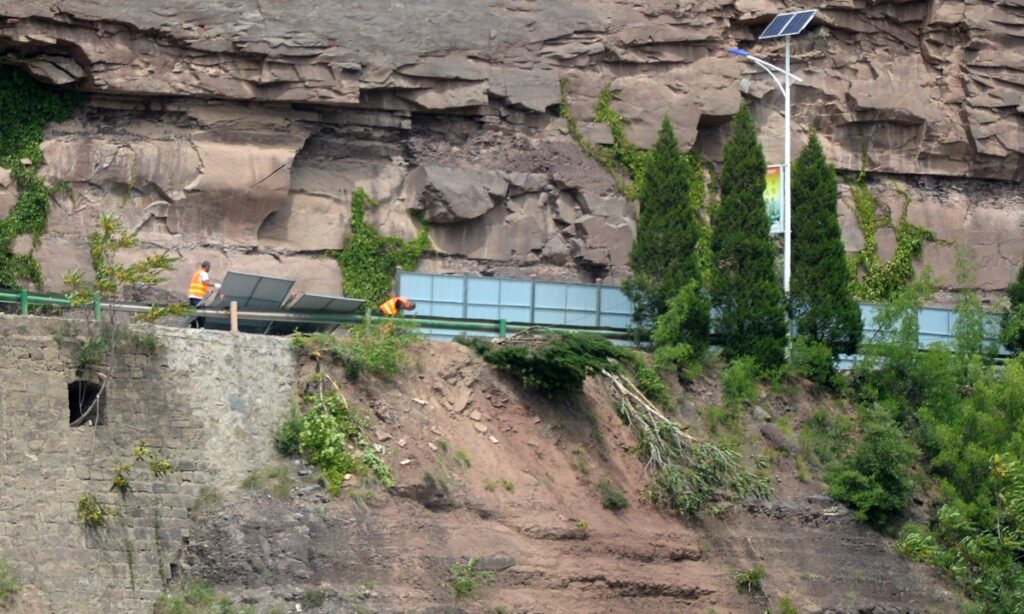Administrators of some scenic spots have faced public criticism for erecting fences to block people without tickets from viewing the scenery recently. Many of these barriers have now been removed amid public pressure, latest media reports show.
These controversial fences or other forms of barriers have been seen near scenic spots including Qinghai Lake, where a 360-km fence was erected around the lake, Hukou Waterfall on the Yellow River, where a fence was constructed along the nearby highway, Meili Snow Mountain, and the Dawan Hydropower Station site on the Jinsha River, where fences were built along the national highway.
These fences were photographed by many netizens and caused a wide discussion on social media. Although the administrators of the scenic spots usually claim that these fences are to protect the safety of tourists, they always appear at the best location to view the scenery, which leads people to question their real motive.
As of Monday, many of these blockages have been removed. China Central Television (CCTV) on Monday reported that the 500-meter “security wall” along the Hukou Waterfall, and the fence blocking the line of sight near Yunnan Jiulong Waterfall scenic area have all been removed, according to CCTV.
The “security wall” along the Hukou Waterfall had aroused widespread concern since May, when its pictures were posted on social networking sites.
The administrators of the scenic area previously claimed that they erected the wall out of security concerns. “This section of the cliff has a large difference in height, is prone to rock falls, and has been the site of several traffic accidents caused by vehicles staying in the way of traffic,” said the administrators.
However, as the blocked area happens to overlook the core landscape of the Hukou Waterfall, it still triggered controversy among netizens.
Media reported that this security wall, which was more than 500 meters long, has been removed as of Monday.
An administrator of the scenic spot said that in the face of public concern, the local management invited experts in traffic, geology, landscape, and cultural tourism to discuss and determine the rectification measure, CCTV reported.
After the removal of the “security wall,” the local authorities vowed to strengthen traffic management on the road and increase traffic police patrols to prevent traffic congestion and accidents. At the same time, the relevant departments will also take other measures to reduce safety hazards.
The person in charge also said that they welcome the general public to put forward more valuable opinions for the quality improvement of the scenic spot.
In the meantime, the sight-blocking fences have also been completely removed near the Jiulong Waterfalls in Qujing of Southwest China’s Yunnan Province. The waterfront guardrails, anti-collision structures at piers and other protection facilities have been retained, according to the local government on Sunday.
After the fence is removed, Luoping county will set up speed bumps and related signs on the section of the road and strengthen traffic safety management, the local government said.
Earlier on June 26, the operator of the Meili Snow Mountain scenic area also vowed to work on rectification, and provide free public access of the attraction.
Wang Xiaoyu, an expert with the World Tourism Cities Federation, said the use of fences to prevent unticketed tourists from seeing the scenery in the scenic area is a short-sighted short-term financial action to utilize resources, which also reflects the lack of awareness of innovation, lack of innovative capacity and lack of professionalism in the development and operation of scenic areas.
Natural landscapes and cultural heritages are the common wealth of humankind, which the administrators only have the right to operate for a certain period of time, and hiding it will only attract resentment, said CCTV in an editorial.
Believing that selling tickets is the only way to make profit out of a scenic spot is a shallow understanding of the development of cultural tourism business, observers noted, pointing out that cultural tourism projects must be built with the concept of openness and sharing.
The Xinhua News Agency pointed out in an editorial that many administrators apply closed management of core scenic areas out of concern for operating costs. However, some operators set fences around non-core scenic areas, peripheral areas and even along the roadside, which is not appropriate.
(Global Times)




